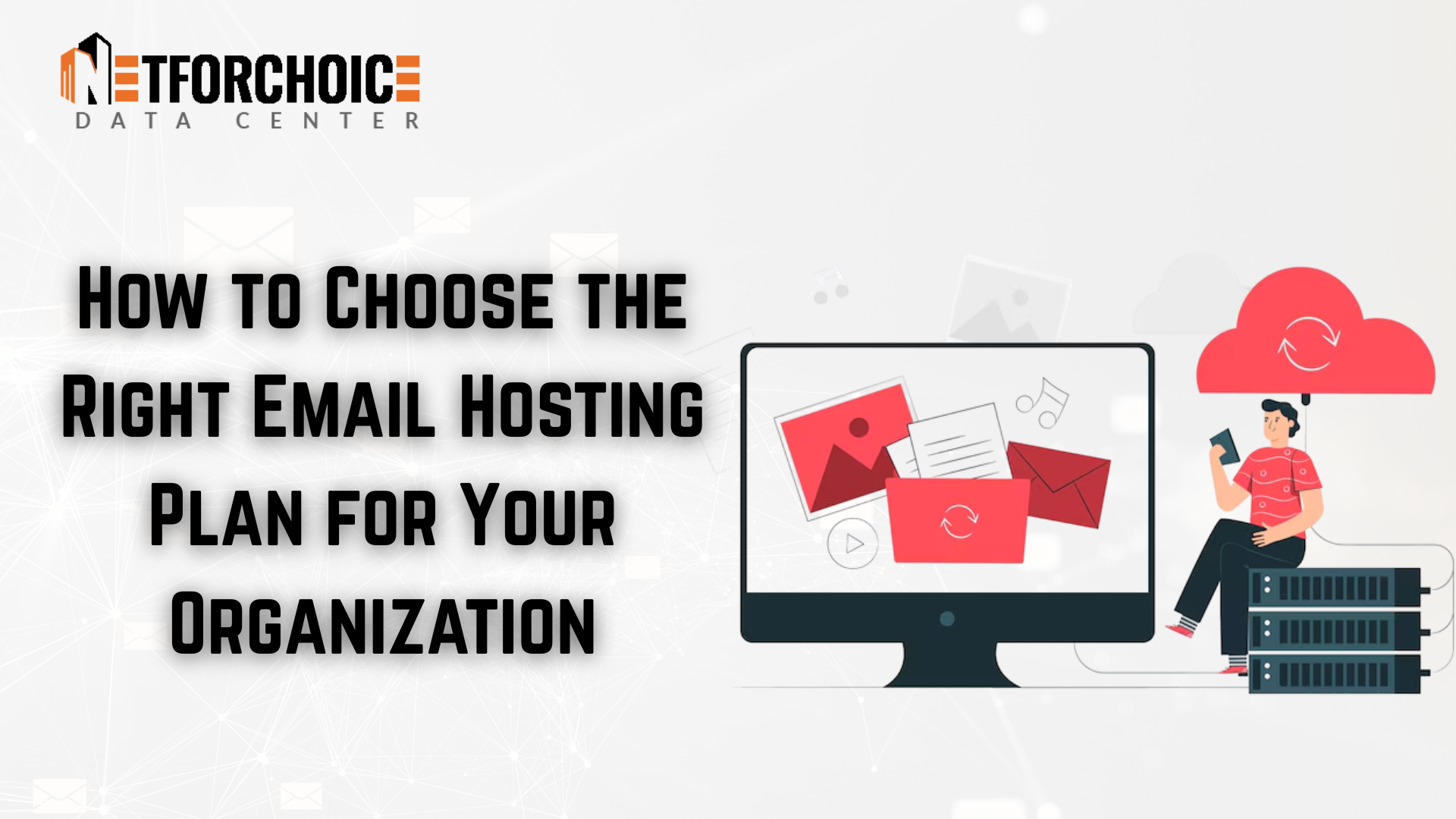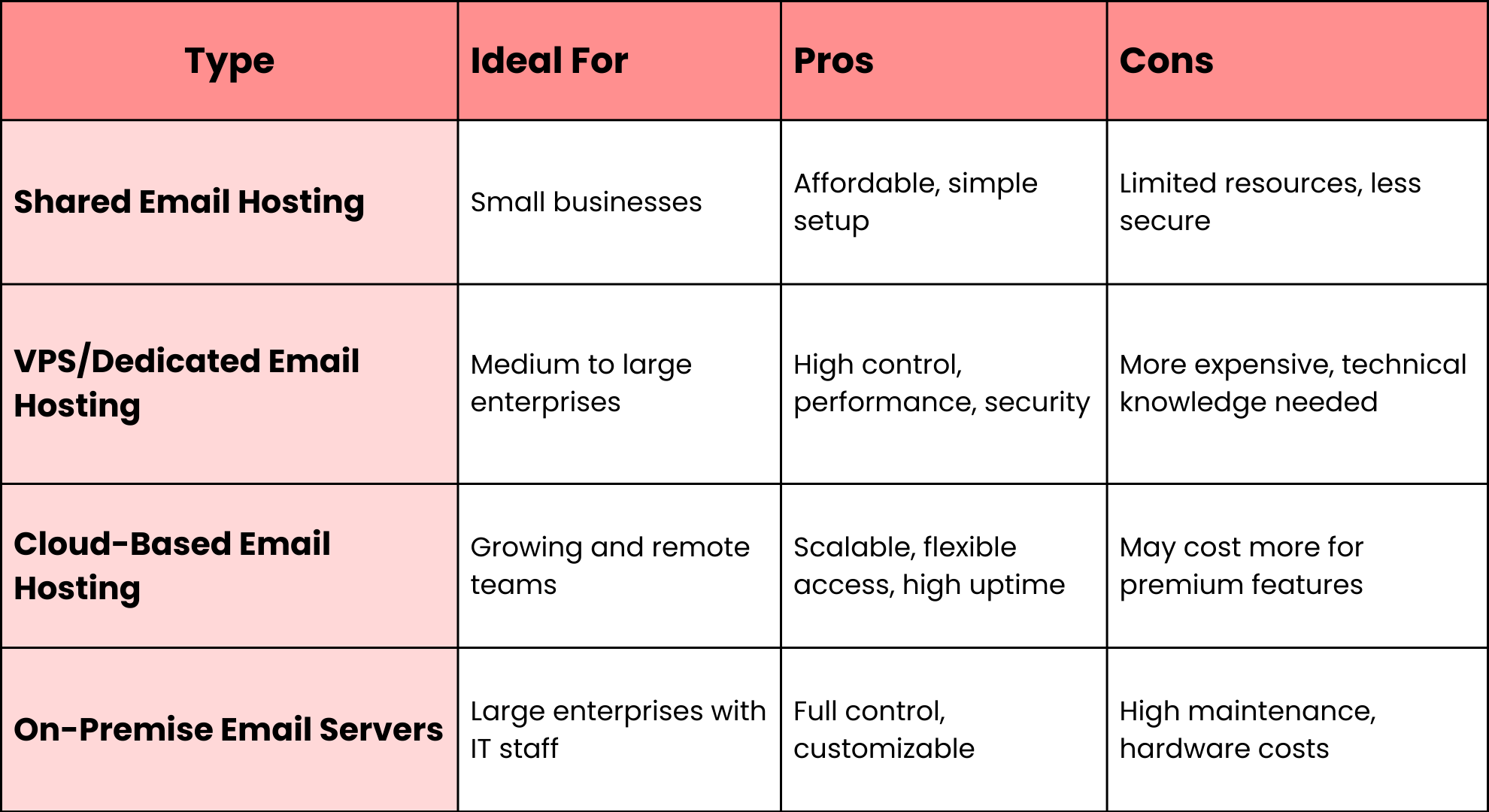email hosting, Hybrid email  Email is the backbone of business in the digital era. Whether working internally or with customers, the reliability and professionalism of your email solution can affect the perception of your business. Custom and secure email hosting provides better communication, as well as additional benefits like data protection, uptime reliability, and corporate continuity.
Finding the best email hosting plan is very important to your business, especially considering most businesses rely on consistently timely and uninterrupted communication. Features can vary greatly from small teams to growing enterprises, so it is crucial to know which features are important to focus on with a business email hosting service.
Email is the backbone of business in the digital era. Whether working internally or with customers, the reliability and professionalism of your email solution can affect the perception of your business. Custom and secure email hosting provides better communication, as well as additional benefits like data protection, uptime reliability, and corporate continuity.
Finding the best email hosting plan is very important to your business, especially considering most businesses rely on consistently timely and uninterrupted communication. Features can vary greatly from small teams to growing enterprises, so it is crucial to know which features are important to focus on with a business email hosting service.

How to Choose the Right Email Hosting Plan for Your Organization
 Email is the backbone of business in the digital era. Whether working internally or with customers, the reliability and professionalism of your email solution can affect the perception of your business. Custom and secure email hosting provides better communication, as well as additional benefits like data protection, uptime reliability, and corporate continuity.
Finding the best email hosting plan is very important to your business, especially considering most businesses rely on consistently timely and uninterrupted communication. Features can vary greatly from small teams to growing enterprises, so it is crucial to know which features are important to focus on with a business email hosting service.
Email is the backbone of business in the digital era. Whether working internally or with customers, the reliability and professionalism of your email solution can affect the perception of your business. Custom and secure email hosting provides better communication, as well as additional benefits like data protection, uptime reliability, and corporate continuity.
Finding the best email hosting plan is very important to your business, especially considering most businesses rely on consistently timely and uninterrupted communication. Features can vary greatly from small teams to growing enterprises, so it is crucial to know which features are important to focus on with a business email hosting service.
What is Email Hosting and Why It Matters
Email hosting refers to a service that hosts your email data on dedicated servers and allows you to send, receive, and store messages using a custom domain (e.g., you@yourcompany.com). Unlike free email accounts, professional email hosting offers added layers of security, better uptime, and scalability. Here’s why business email hosting is a must-have:- Enhances brand credibility with domain-specific addresses.
- Offers built-in security and spam filtering.
- Scales easily as your team grows.
- Provides administrative control and compliance options.
Top Factors to Consider When Choosing an Email Hosting Plan
1. Organization Size & Scalability
Startups might begin with just a few users, while established enterprises may need hundreds of mailboxes. Your hosting plan should be flexible enough to grow with your business without forcing unnecessary upgrades.2. Mailbox Storage and Limits
Check how much storage is offered per user. Standard plans usually start at 5GB per mailbox, but businesses that deal with large file transfers may need 25GB or more. Also, ensure the provider supports large attachment sizes.3. Email Security & Spam Protection
Choose a provider that offers:- Spam and malware filtering
- Virus protection
- Support for SPF, DKIM, and DMARC records
- Two-factor authentication (2FA)
4. Uptime Reliability
Downtime is costly. Always opt for providers offering at least 99.9% uptime and robust infrastructure with geographically redundant servers.5. Admin Panel and User Management
Look for a clean, user-friendly interface for administrators to:- Add/remove users
- Reset passwords
- Monitor email usage
- Set permissions and roles
6. Customer Support
Email issues need quick resolution. Ensure the provider offers 24×7 support through phone, chat, or email, with fast response times.7. Backup & Archiving
Automatic email backups and long-term email archiving are vital for disaster recovery and legal compliance. This is particularly important for businesses in regulated sectors.8. Compatibility & Integration
Ensure that the service integrates well with:- Outlook, Thunderbird, Apple Mail
- Mobile platforms (iOS, Android)
- Productivity tools (Microsoft 365, CRMs, ERPs)
9. Migration Support
If you’re moving from Gmail, Zoho, or an in-house server, check if the provider offers seamless migration support. This reduces downtime and preserves historical data.10. Cost and Value for Money
Compare the features offered against the price. Some providers may appear affordable upfront but charge extra for essentials like backups, support, or security.Types of Email Hosting Solutions

Industry-Specific Use Cases of Email hosting
Different industries have different requirements.- Healthcare: Needs HIPAA-compliant and encrypted communication.
- Finance & Legal: Must maintain logs, retain email records, and implement advanced phishing protection.
- Startups: Need budget-friendly, flexible plans with room to scale.
- Remote Teams: Prefer cloud hosting with mobile access and team collaboration features.
Why Businesses Choose NFC Mail
When it comes to dependable and scalable email hosting, many businesses trust NFC Mail, the professional email solution offered by NetForChoice. Here’s why:- Domain-based email accounts for brand consistency
- Enterprise-grade security with spam and malware protection
- Cloud infrastructure hosted in Tier-4 Indian data centers
- Free email migration with zero data loss
- 24×7 expert support for peace of mind
- Easy integration with Outlook, mobile apps, and business tools
Also Read: Why NetForChoice is the Best Email Hosting Service Provider in India – Know the Reasons
Final Thoughts
Your company’s email is not only a communication tool, but it represents your brand, it holds important data, and it can be your first line of defense from cyber threats. This is why not only is selecting an email hosting plan a technical choice, but it is also a strategic decision. When you consider your company’s size, the security requirements, and future requirements, your email hosting plan should give you the best combination of performance, value, and peace of mind. If you’re looking for a mixture of security, scalability, and expert support, NFC Mail from NetForChoice was built to do all of those things and more.Submit Your Query

